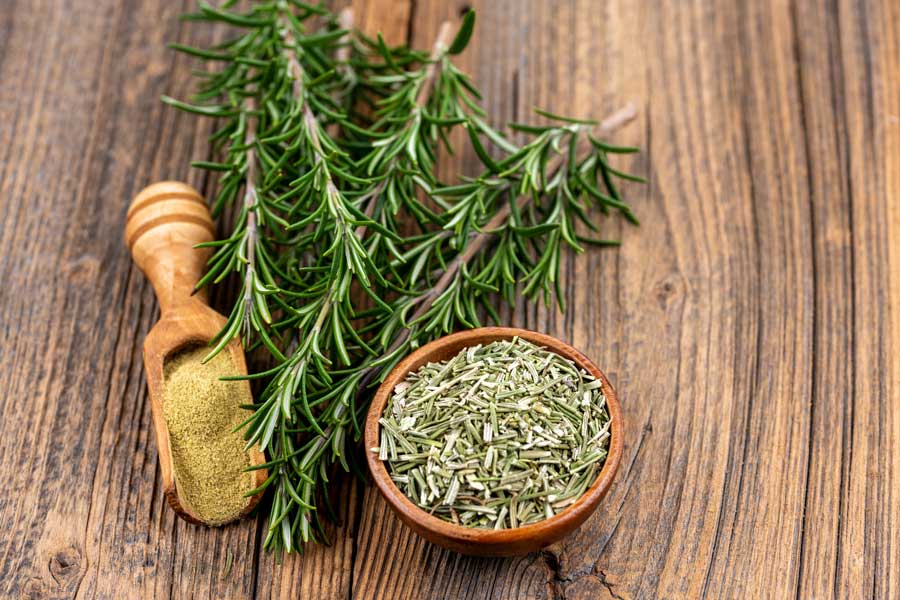Benefits of Rosemary Bath: What Research Says About This Herbal Soak
This post contains affiliate links. If you click and make a purchase, I may receive a commission. Thanks.

We’ve all heard tales of the wonders of rosemary baths, a tradition dating back centuries. There’s no denying the soothing sensation it offers once we sink into the water. But how often do we stop to ask, “What does science have to say about this?” In this post, I’ll dive deep into the genuine benefits and the research that backs them up. Plus, I’ll guide you on the best ways to infuse rosemary into your bath, ensuring you reap its maximum rewards. Ready to soak in some knowledge?
ROSEMARY BATH BENEFITS

1. STRESS AND ANXIETY RELIEF
The calming scent of rosemary is more than just a delightful aroma. Immersing in a rosemary-infused bath offers amazing aromatherapy benefits – it aids in reducing cortisol, the stress hormone. And not only that. It also offers therapeutic benefits that can alleviate anxiety and elevate mood. A comprehensive study from 2007, published in the Journal of the Science of Food and Agriculture, pinpointed specific compounds in rosemary that play a role in regulating stress by interacting with significant biochemical pathways in our body. Imagine soaking in such beneficial richness every time you take a rosemary-infused bath!
2. MUCLE ACHE RELIEF
Rosemary is celebrated not just for its aromatic charm but also for its therapeutic compounds like rosmarinic acid, renowned for their anti-inflammatory effects. It’s an invaluable aid for those grappling with joint pains or muscle aches, offering relief after demanding physical activities or prolonged standing. Alongside alleviating soreness, a rosemary bath is also touted for improving circulation, promoting muscle recovery post-sports, and playing a significant role in reducing the appearance of cellulite. Both the Journal of Ethnopharmacology and a comprehensive review in Current Medicinal Chemistry offer scientific insights, underscoring the benefits of rosemary in enhancing blood flow and combatting inflammation, respectively. Soaking in a rosemary-infused bath becomes a complete experience, weaving together relaxation, revitalization, and a myriad of health benefits.
3. GLOWING SKIN
Did you know rosemary can help make your skin look younger? This lovely herb is packed with antioxidants that protect our skin from damage and signs of aging, leading to tighter and more youthful skin. A 2013 study highlighted how great rosemary is for our skin. These antioxidants in rosemary help make the skin tight and give it a healthy glow. So, when you use rosemary, you’re not just enjoying its scent; you’re also helping your skin look radiant and glowing!
4. RESPIRATORY RELIEF
Breathing in the scent of rosemary during your bath isn’t just to indulge your senses. A research endeavor cited in the European Journal of Medical Research illustrated rosemary’s antimicrobial benefits that can help in clearing the respiratory tract, especially beneficial during allergy seasons or colds.
5. ANTI-MICROBIAL & ANTI-FUNGAL PROPERTIES
Rosemary possesses antimicrobial properties, making a rosemary bath a great way to naturally disinfect the skin, especially if one is prone to fungal infections or skin issues. Rosemary’s antifungal properties where highlighted in a a study in the Antioxidants journal.
6. SCALP AND HAIR HEALTH
If you’re the type to immerse your hair in the bath, rosemary’s benefits go beyond just your skin. Not only can it help tackle dandruff and boost overall scalp health, but there’s also evidence it might promote hair growth. A study from Phytotherapy Research points out the potential of rosemary oil in enhancing hair growth. So, the next time you soak in a rosemary bath, remember it’s a treat for both your skin and your locks!
7. IMPROVED MEMORY AND CONCENTRATION
Legend has it that ancient scholars wore rosemary wreaths during exams. Science now backs this folklore. An enlightening 2012 study from Therapeutic Advances in Psychopharmacology found that merely inhaling rosemary aroma could boost aspects of cognitive performance and memory.
While soaking in a bath might not replace studying, the invigorating aroma of rosemary can sharpen focus and boost alertness.

HOW TO ADD ROSEMARY TO YOUR BATH. WHAT IS THE MOST EFFECTIVE WAY?
1. Fresh Rosemary Leaves:
How to Use: Simply take a handful of fresh rosemary and either tie them in a muslin cloth or let them float freely in your bath. The heat from the water will help release the aromatic oils and benefits of the rosemary.
Benefits: Using fresh rosemary leaves ensures that you’re getting the natural essence of the plant, including its aromatic oils. It provides a mild effect, perfect for those who want a gentle infusion of rosemary in their bath.
2. Dried Rosemary:
How to Use: Place a generous amount of dried rosemary in a muslin bag or tea infuser and let it steep in your hot bathwater.
Benefits: Dried rosemary tends to have a concentrated aroma compared to its fresh counterpart. While it offers many of the same benefits as fresh rosemary, its dried nature means some volatile compounds might have diminished over time.
3. Rosemary Essential Oil:
How to Use: Add a few drops of rosemary essential oil to your bath. It’s potent, so a little goes a long way! For even distribution and to prevent the oil from floating on top, you can mix the essential oil with a carrier oil (like coconut or almond oil) before adding it to the bath.
Benefits: Rosemary essential oil is the most concentrated form of rosemary and is packed with beneficial compounds. It offers the most potent benefits compared to fresh or dried rosemary. Essential oils can penetrate the skin more easily, delivering the therapeutic properties of rosemary more effectively.
Verdict: While all methods have their merits, Rosemary Essential Oil stands out as the most effective way to harness the full range of rosemary’s benefits in your bath. However, for those who prefer a milder experience or love the ritual of using plant materials, fresh and dried rosemary are wonderful alternatives.
What is your favorite way to infuse rosemary into your bath?

i drink rose mary tea very soothing use in hair it very good and very relaxing afterward